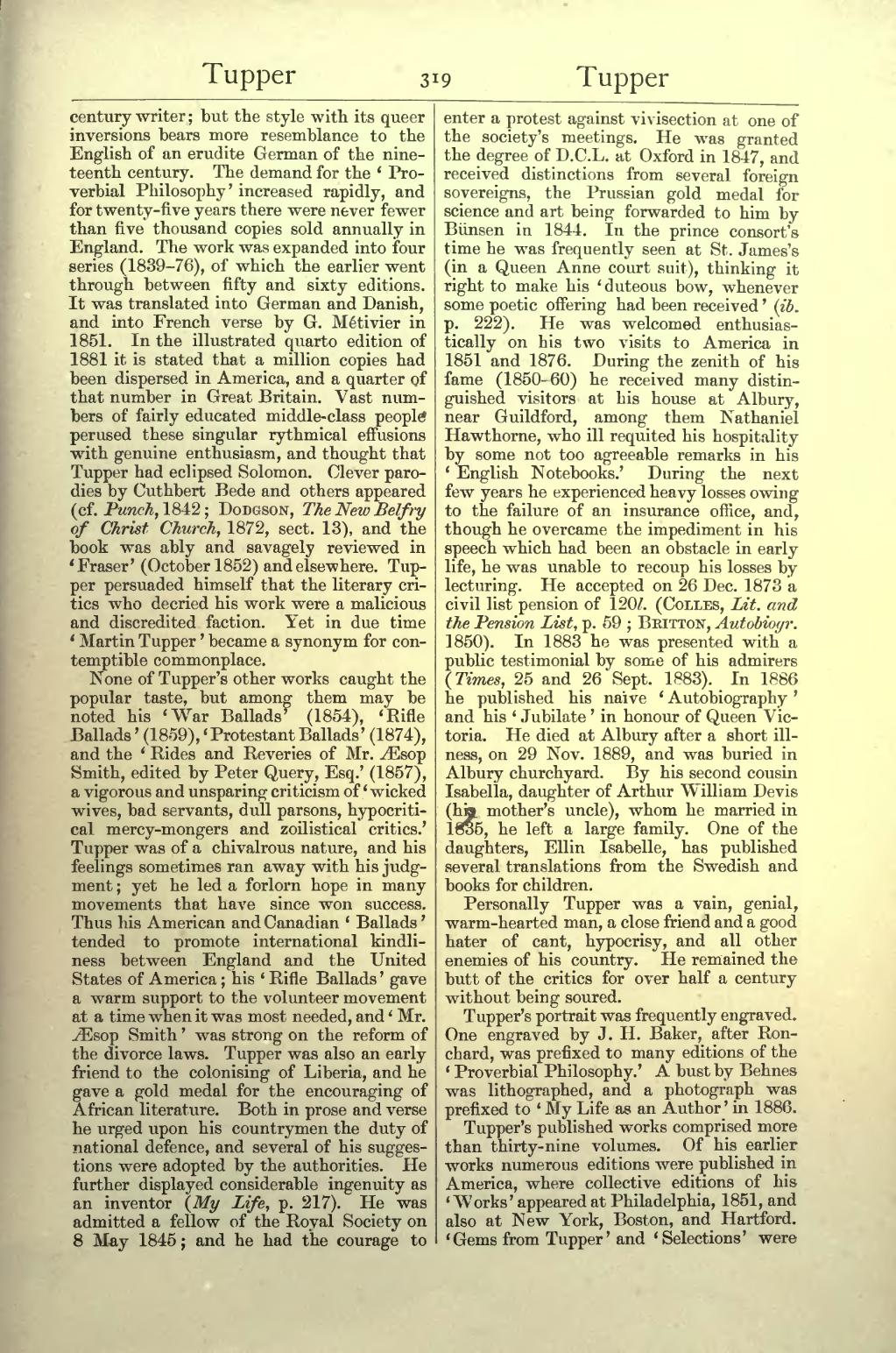century writer; but the style with its queer inversions bears more resemblance to the English of an erudite German of the nineteenth century. The demand for the ‘Proverbial Philosophy’ increased rapidly, and for twenty-five years there were never fewer than five thousand copies sold annually in England. The work was expanded into four series (1839–76), of which the earlier went through between fifty and sixty editions. It was translated into German and Danish, and into French verse by G. Métivier in 1851. In the illustrated quarto edition of 1881 it is stated that a million copies had been dispersed in America, and a quarter of that number in Great Britain. Vast numbers of fairly educated middle-class people perused these singular rythmical effusions with genuine enthusiasm, and thought that Tupper had eclipsed Solomon. Clever parodies by Cuthbert Bede and others appeared (cf. Punch, 1842; Dodgson, The New Belfry of Christ Church, 1872, sect. 13), and the book was ably and savagely reviewed in ‘Fraser’ (October 1852) and elsewhere. Tupper persuaded himself that the literary critics who decried his work were a malicious and discredited faction. Yet in due time ‘Martin Tupper’ became a synonym for contemptible commonplace.
None of Tupper's other works caught the popular taste, but among them may be noted his ‘War Ballads’ (1854), ‘Rifle Ballads’ (1859), ‘Protestant Ballads’ (1874), and the ‘Rides and Reveries of Mr. Æsop Smith, edited by Peter Query, Esq.’ (1857), a vigorous and unsparing criticism of ‘wicked wives, bad servants, dull parsons, hypocritical mercy-mongers and zoilistical critics.’ Tupper was of a chivalrous nature, and his feelings sometimes ran away with his judgment; yet he led a forlorn hope in many movements that have since won success. Thus his American and Canadian ‘Ballads’ tended to promote international kindliness between England and the United States of America; his ‘Rifle Ballads’ gave a warm support to the volunteer movement at a time when it was most needed, and ‘Mr. Æsop Smith’ was strong on the reform of the divorce laws. Tupper was also an early friend to the colonising of Liberia, and he gave a gold medal for the encouraging of African literature. Both in prose and verse he urged upon his countrymen the duty of national defence, and several of his suggestions were adopted by the authorities. He further displayed considerable ingenuity as an inventor (My Life, p. 217). He was admitted a fellow of the Royal Society on 8 May 1845; and he had the courage to enter a protest against vivisection at one of the society's meetings. He was granted the degree of D.C.L. at Oxford in 1847, and received distinctions from several foreign sovereigns, the Prussian gold medal for science and art being forwarded to him by Bünsen in 1844. In the prince consort's time he was frequently seen at St. James's (in a Queen Anne court suit), thinking it right to make his ‘duteous bow, whenever some poetic offering had been received’ (ib. p. 222). He was welcomed enthusiastically on his two visits to America in 1851 and 1876. During the zenith of his fame (1850–60) he received many distinguished visitors at his house at Albury, near Guildford, among them Nathaniel Hawthorne, who ill requited his hospitality by some not too agreeable remarks in his ‘English Notebooks.’ During the next few years he experienced heavy losses owing to the failure of an insurance office, and, though he overcame the impediment in his speech which had been an obstacle in early life, he was unable to recoup his losses by lecturing. He accepted on 26 Dec. 1873 a civil list pension of 120l. (Colles, Lit. and the Pension List, p. 59; Britton, Autobiogr. 1850). In 1883 he was presented with a public testimonial by some of his admirers (Times, 25 and 26 Sept. 1883). In 1886 he published his naive ‘Autobiography’ and his ‘Jubilate’ in honour of Queen Victoria. He died at Albury after a short illness, on 29 Nov. 1889, and was buried in Albury churchyard. By his second cousin Isabella, daughter of Arthur William Devis (his mother's uncle), whom he married in 1835, he left a large family. One of the daughters, Ellin Isabelle, has published several translations from the Swedish and books for children.
Personally Tupper was a vain, genial, warm-hearted man, a close friend and a good hater of cant, hypocrisy, and all other enemies of his country. He remained the butt of the critics for over half a century without being soured.
Tupper's portrait was frequently engraved. One engraved by J. H. Baker, after Ronchard, was prefixed to many editions of the ‘Proverbial Philosophy.’ A bust by Behnes was lithographed, and a photograph was prefixed to ‘My Life as an Author’ in 1886.
Tupper's published works comprised more than thirty-nine volumes. Of his earlier works numerous editions were published in America, where collective editions of his ‘Works’ appeared at Philadelphia, 1851, and also at New York, Boston, and Hartford. ‘Gems from Tupper’ and ‘Selections’ were
